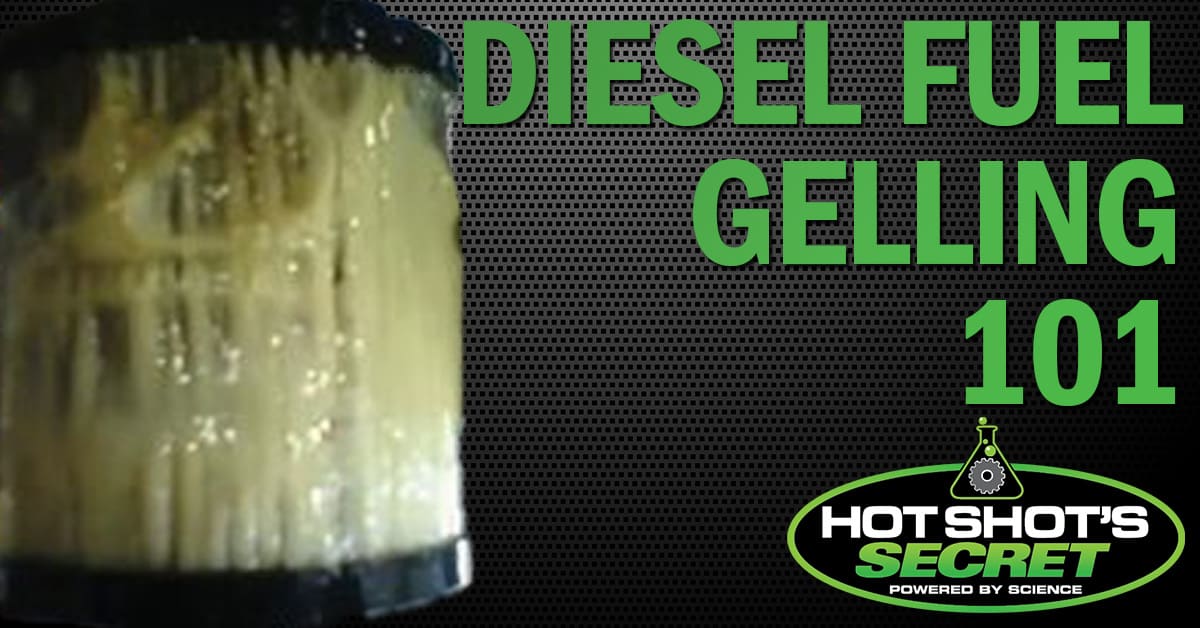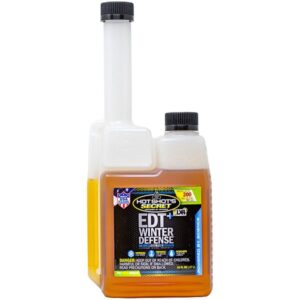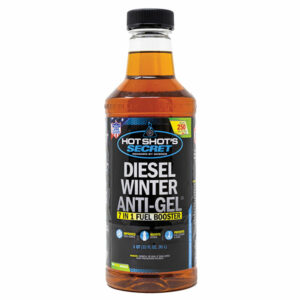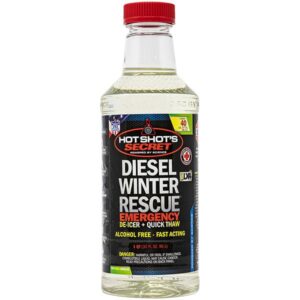
Idling alone isn’t enough to prevent gelling in extremely cold conditions. In specific temperature ranges, diesel may thicken or “gel,” reducing vehicle efficiency, increasing engine strain and introducing potential for damage.
While it’s a common belief that idling your diesel vehicle can prevent gelling, the heat from idling is generally insufficient to keep the fuel warm.
Understanding Diesel Fuel Gelling
Diesel gels because it contains paraffin wax. When temperatures get extremely cold, the wax crystallizes, thickening the fuel and reducing efficiency. It can negatively impact fuel filters and lines by clogging them and reducing flow rates.
Diesel fuel gelling has three main terms you should know:
- Cloud point: This is the initial stage of gelling — cloud point is when paraffin wax crystals start forming and becoming visible.
- Pour point: This is the lowest temperature at which diesel fuel is still liquid enough to pour.
- Cold filter plugging point: The stage that diesel gels to the point at which there are too many wax crystals, causing a blockage in the fuel filter.
The Effect of Idling on Diesel Fuel
Idling is ineffective to prevent fuel gelling for multiple reasons, including:
- Limited fuel circulation: When idling, engines experience limited fuel circulation, resulting in an insufficient blending of warm and cold fuel to raise the temperature throughout the system. While a high idle may be more effective, it may be inadequate in extreme temperatures.
- Insufficient engine heat: Idling your vehicle means the engine runs below optimal temperature and with fewer revolutions per minute. As a result, the fuel doesn’t reach a sufficient temperature to efficiently eliminate wax crystals or heat system components.
- Moisture buildup: Sometimes, idling can allow condensation to form inside fuel tanks, which exacerbates freezing problems. Since water freezes relatively easily compared to most fluids, water contamination in the fuel tank is a considerable problem and should be avoided.
Potential Downsides of Excessive Idling
When trying to prevent diesel fuel gelling, consider that idling may also affect your vehicle negatively. Some of the possible consequences include increased engine wear, reduced fuel economy, and more engine emissions — all without solving the gelling issue.
Proven Methods to Prevent Diesel Gelling
To prevent gelling, here are some trusted winter diesel fuel tips to help you maintain your diesel vehicle this season.
1. Use Winterized Diesel Fuel
In many of the colder states, gas stations will switch to a winter-specific diesel blend that comprises a treated #2 diesel or a mix of #1 and #2 diesels. These blends generally have lower cloud and pour points to avoid gelling. While useful, not all blends are equally effective, so experts may recommend using fuel additives.
2. Add Anti-Gel Diesel Additives
Diesel fuel additives with winter-specific formulations are the most effective solution to prevent diesel fuel from gelling. They protect fuel at extremely low temperatures by modifying the chemical composition of paraffin wax to reduce or eliminate gelling at colder temperatures.
Some excellent options are multipurpose products like EDT+ Winter Defense, which meet all your basic deicing and anti-gelling needs. They also offer additional benefits like improved lubricity plus boost cetane for better cold starts. Emergency products like Diesel Winter Rescue don’t prevent gelling, but they’re focused de-icing and gelling diesel fuel quickly to get you running again.
3. Keep Fuel Tanks Full
While few people realize the significance of this, a full fuel tank can significantly reduce the fuel’s exposure to air and potential for condensation. In winter, keep your fuel tank as full as possible to prevent freezing due to water contamination and to reduce exposure to cold air that can accelerate fuel gelling.
4. Use Fuel Heaters
Installing a fuel heater in your vehicle can also help to prevent gelling and maintain good temperatures in the fuel system. These tools effectively keep the fuel above cloud point to prevent gelling, which protects your fuel lines and filters from potential damage.
A block heater is a similar option that doesn’t focus on heating fuel. Instead, it heats the engine block and core components to help reduce gelling within the main fuel lines.
Avoid Excessive Idling: Prevent Diesel Fuel From Gelling With Hot Shot’s Secret Winter Additives
Don’t rely on idling as a solution — it’s ineffective and may even damage your vehicle. Avoid the dreaded diesel fuel gelling or freezing problems this winter with premium solutions from Hot Shot’s Secret.
Choose EDT+ Winter Defense for your day-to-day maintenance additive, or Diesel Winter Rescue to de-gell diesel fuel quickly to get you running again.



